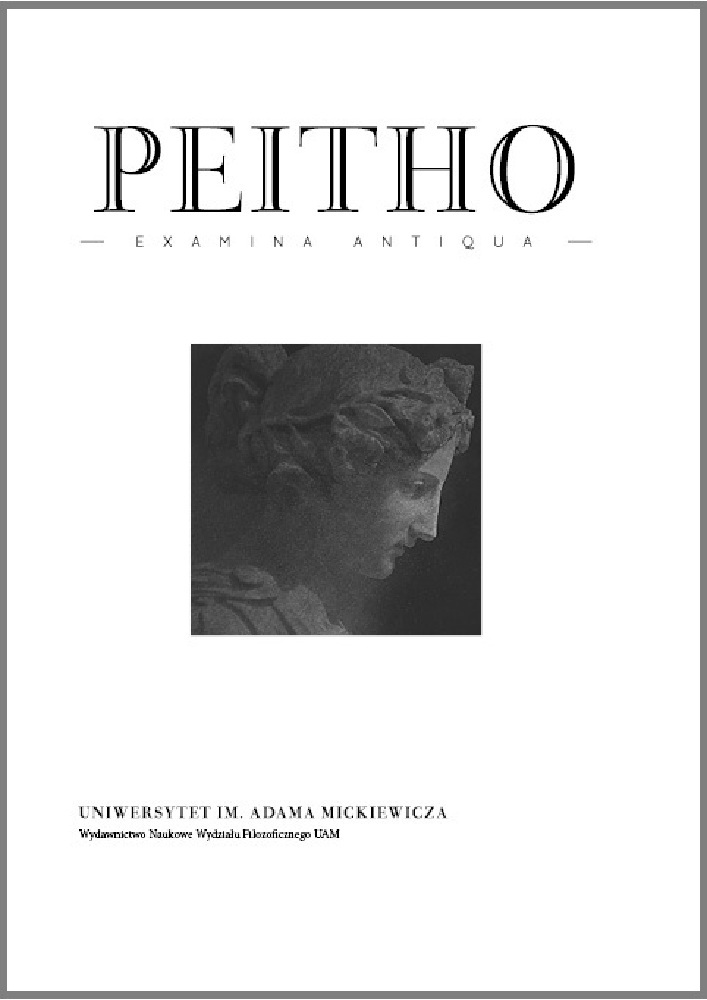Abstract
The present article is divided into two parts: the first focuses on the affections of the soul in general, while the second part investigates the case of melancholy, as it is studied from Aristotle and the Stoics to Galen. The main point of the first part is an analysis of the Chrysippean treatise On the Affections of the Soul as it appears in the Galenic treatise On the Doctrines of Hippocrates and Plato. The analysis identifies several Chrysippean influences from Plato and Aristotle regarding the psyche. In the second part, the case of melancholy is analyzed through the pseudo-Aristotelian treatise Problem XXX 1. The discussion shows the common points between the Aristotelian text and the Chrysippean fragments regarding the issue of melancholy. This article aims to bring to light the evolution of the phenomenon of melancholy in Galen’s thought, which is connected with the study of both medical and philosophical texts already existing before him.
References
Baloyannis, S. J., 2006, “Galen on the functional expression of the soul by the brain,” Encephalos. Archives of Neurology and Psychiatry 43 [1], http://www.encephalos.gr/43-1-01e.htm [the last access: 06.11.2020].
Barras, V., Birchler, T., 1994, “La perfection de l’homme chez Galien,” Equinoxe 11, pp. 27–36.
Bazou, A. (ed.), 2011, Galenos, Hoti tais tou somatos krasesin ai tes psyches dynameis hepontai, Athens.
Bekker, I. (ed.), 1854, Suidae lexicon, Berlin.
Boudon, V. (ed.), 2002, Galien, Exhortation à l’étude de la medicine. Art medical, Paris.
Boudon-Millot, V., 2000, “Galien,” in: Dictionnaire des philosophes antiques, R. Goulet (dir.), Paris, pp. 440–466.
Boudon-Millot, V., Jouanna, J. (ed.), 2010, Galien, Ne pas se chagriner, Paris.
Bréhier, É., 1971, Chrysippe et l’ancien Stoïcisme, Paris–Londres–New York.
Chauvet, E., 1857, Mémoire sur le Traité de Galien: des Dogmes d’Hippocrate et de Platon, Paris.
Cornford, F. M., 1937, Plato’s Cosmology, London.
Daraki, M., 1989, Une religiosité sans Dieu. Essais sur les Stoïciens d’Athènes et saint Augustin, Paris.
Daremberg, Ch., 1848, Fragments du commentaire de Galien sur le Timée de Platon, Paris–Leipzig.
Daremberg, Ch., Ruelle, É., 1879, Ouvres de Rufus d’Éphèse, Paris.
De Boer, W. (ed.), 1937, De priopriorum animi cuiuslibet dignotione et curatione, Leipzig–Berlin.
De Lacy, Ph. (ed.), 1981, On the Doctrines of Hippocrates and Plato, Berlin.
Frede, M., 1974, “Stoic vs. Aristotelian syllogistic,” Archiv für Geschichte der Philosophie 56, pp. 1–32.
Gourinat, J. B., 2017, Les Stoïcens et l’âme, Paris.
Grafton, A., Most, G. W., Settis, S., 2010, The Classical Tradition, Cambridge–London.
Hankinson, J., 2009, “Actions and Passions: Affection, Emotion, and Moral self-management in Galen’s Philo¬sophical Psychology,” in: J. Brunschwig, M. Nusbaum (eds.), Passions and Perceptions, Studies in Hellenistic Philosophy of Mind, pp. 184–222.
Helmreich, G. (ed.), 1907–1909, Galeni de usu partium libri, Leipzig [Amsterdam 1968].
Hicks, R. D. (ed.), 1958, Diogenes Laertius, Lives of Eminent Philosophers, vol. I–II, London–Cambridge.
Klibansky, R., Panofsky, E., Saxl, F., 1989, Saturne et la mélancolie, Paris.
Kneale, W., Kneale, M., 1962, The Development of Logic, Oxford.
Kreuttner, X., 1885, Andronicus Rhodius, De passionibus, Heidelberg.
Liddell, H. G., Scott, R., 1996, A Greek-English Lexicon, Oxford.
Manuli, P., 1992, “Galien et le Stoïcisme,” Revue de Métaphysique et de Morale 97 [3], pp. 365–375.
Mates, B., 1953, Stoic Logic, Berkeley.
Mignucci, M., 1972, Il significato della logica stoica, Bologna.
Miller, H. W., 1962, “The Aetiology of Disease in Plato’s Timaeus,” Transactions of the American Philological Association 93, pp. 175–187.
Mirhady, D. (ed.), 2011, Aristotle, Problems. Books 20–38, Cambridge.
Moraux, P. (ed.), 1985, Galien de Pergame, Souvenirs d’un médecin, Paris.
Moraux, P., 1976, “Galien et Aristote,” in: F. Bossier et alii (ed.), Images of Man in Ancient and Medieval Thought. Studia Gerardo Verbeke ab amicis et colleges dicata, Leuven, 1976, pp. 127–146.
Moraux, P., 1981, “Galien comme philosophe: la philosophie de la nature,” in V. Nutton (ed.), Galen. Problems and Prospects, Cambridge, pp. 87–116
Moutsopoulos, E., 1991, La mise et l’enjeu, Paris.
Nickel, D. (ed.), 2001, Galeni de foetum formatione, Berlin.
Northwood, H., 1998, “The Melancholic Man: The Aristotelian Problema XXX.1,” Paideia. Ancient Philosophy, https://www.bu.edu/wcp/Papers/Anci/AnciNort.htm [last access: 08.11.2020].
Petit, C. (ed.), 2009, Galien, Le médecin. Introduction, t. 3, Paris.
Pigeaud, J., 1988, “La psychopathologie de Galien,” in: P. Manuli, M. Vegetti (cur.), Le opere psicologiche di Gale¬no, Napoli, pp. 153–183.
Pigeaud, J., 2006a, Aristote, L’homme de génie et la mélancolie, Paris.
Pigeaud, J., 2006b, La maladie de l’âme. Étude sur la relation de l’âme et du corps dans la tradition médico-phi¬losophique antique, Paris.
Pohlenz, M., 1963, La libertà greca, M. Bellicioni (trad.), Brescia.
Schuhl, P.-M. (dir.), 1962, Les Stoïciens. Cléanthe. Diogène Laërce. Plutarque. Cicéron. Sénèque. Épictète. Marc-Aurèle, É. Brehier et al. (trad.), Paris.
Singer, P. N., 2018, “Galen’s Pathological Soul: Diagnosis and Therapy in Ethical and Medical Texts and Contexts,” in: C. Thumiger, P. N. Singer (eds.), Mental Illness in Ancient Medicine, from Celsius to Paul of Aegina, Leiden–Boston, pp. 381–420.
Singer, Ρ. Ν. (ed.), 2013, “Introduction,” in: Galen, Psychological Writings, Cambridge, pp. 205–236.
Thivel, A., 1965, “La doctrine des περισσώματα et ses parallèles hippocratiques,” Revue de philologie, de litté¬rature et d’histoire anciennes 39, pp. 266–282.
Tieleman, T., 2003, Chrysippus’ On Affections. Reconstruction and Interpretation, Leiden–Boston.
Walz, Ch., 1834, Rhetores Graeci, vol. VII, Stutgart–Tübingen.
Zaharia, C., 2003, La parole mélancolique. Une archéologie du discours fragmentaire, University of Bucharest.
License
Peitho provides immediate open access to its content on the principle that making research freely available to the public supports a greater global exchange of knowledge.
